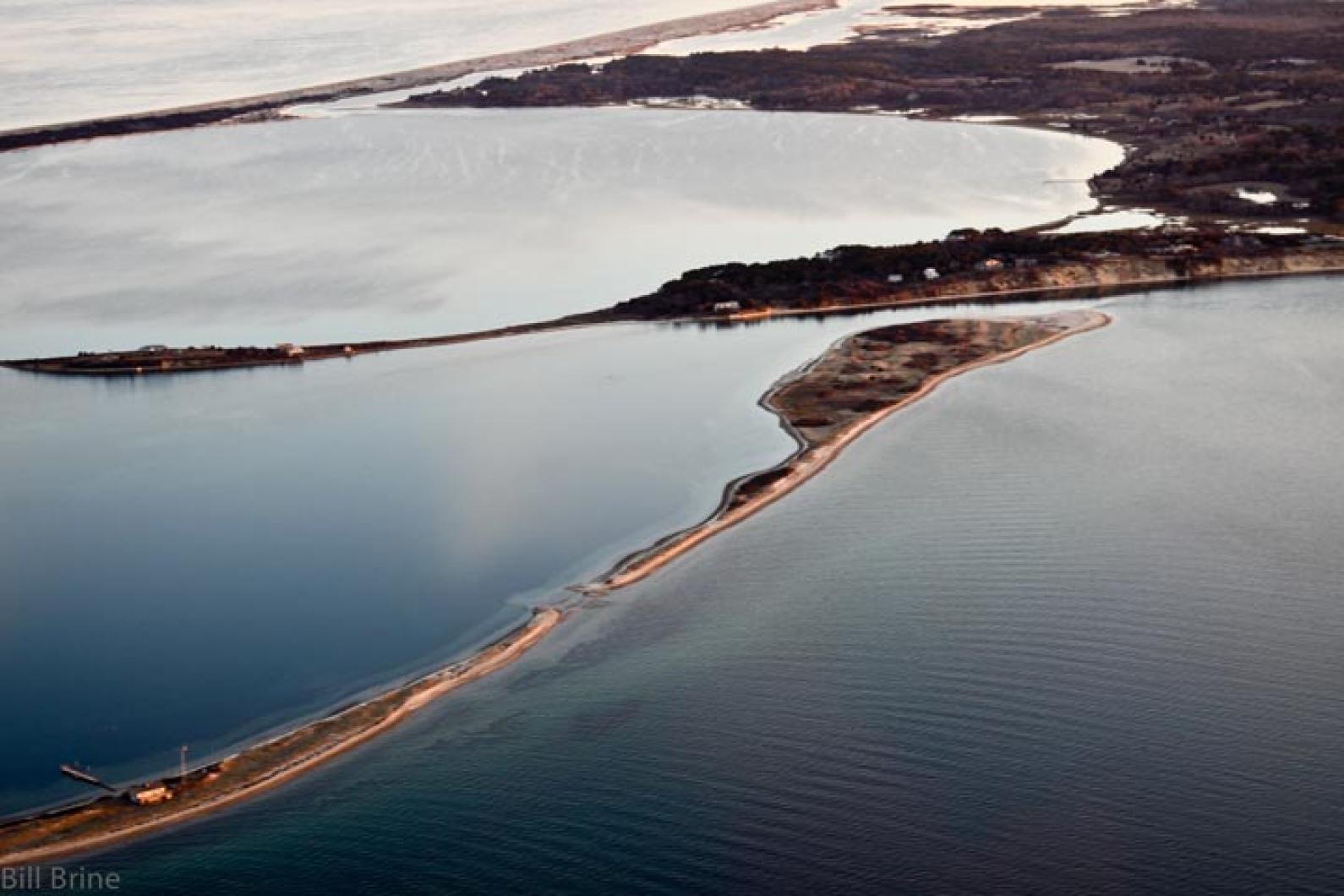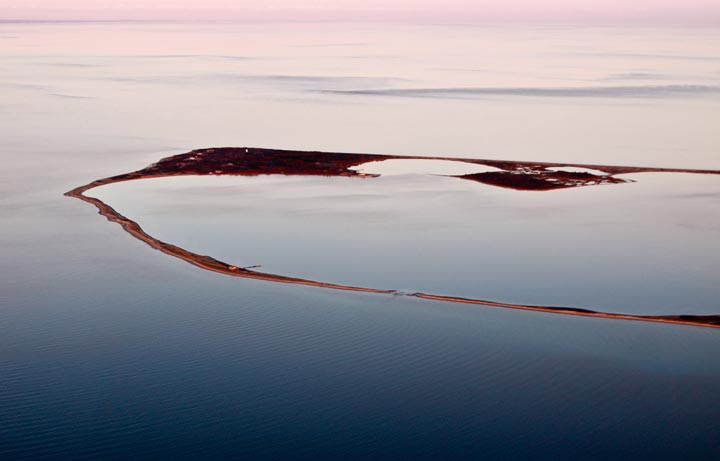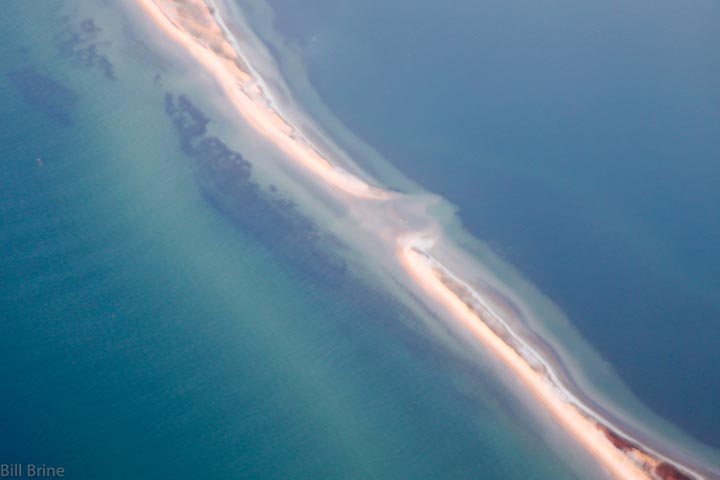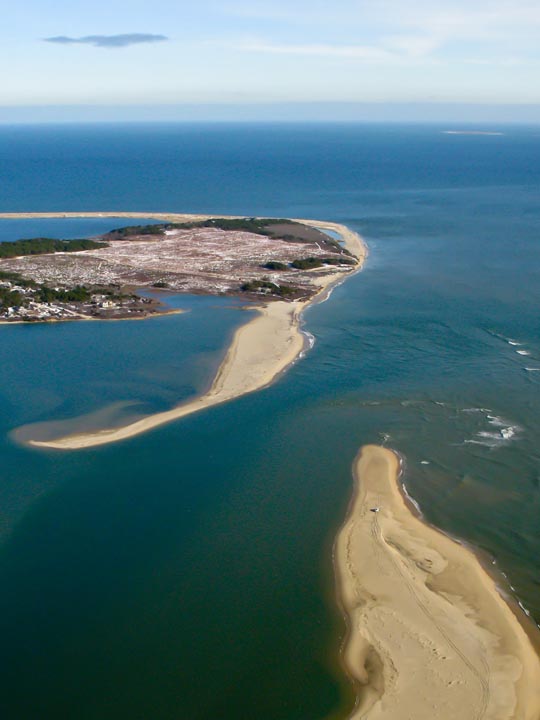High winds, raging seas and strong currents have been hard on Chappaquiddick this winter. Large areas of beach down at Wasque have been moved and removed, lately at the rate of a foot a day. But the latest changes are at the other end of Chappy, where the post-Christmas northeaster cut a new opening on a barrier beach at Cape Pogue Pond.
High seas from the northwest cut the fragile barrier and created in effect a new island where it was a peninsula. With that cut, the Cape Pogue elbow is at least for now an island, separated from the rest of the narrow barrier beach that surrounds the pond.
The breach is more than 100 feet in length and it is tidal; water rushes in with a rising tide and exits the pond with the falling tide. It is believed that the key elements of the cut occurred during the big northeaster that came after Christmas Day. Then the winds turned around to the northwest and for days sent ocean-sized swells across Nantucket Sound toward the Cape Pogue Pond barrier beach.
The site of the opening is several hundred yards away from the familiar old Norton Camp, often referred to as the wind mill house, and on the way to the Gut.
If the breach were to be permanent, it would prevent local shore fishermen from having vehicular access to one of their favorite fishing spots, a place where anglers can cast their lures and baited hooks into the narrow channel that connects the pond to the outer Edgartown harbor.
“That is a low area to begin with,” said Chris Kennedy, southeast regional director for The Trustees of Reservations, the organization that oversees the Cape Pogue Pond properties.
“It was a major wash-over. You can call it a breach,” he said, adding: “My hope is that it is ephemeral, and that it will heal and close in the near future.”
Mr. Kennedy said the previous owner of the house, “Mike Pacella was clearly concerned about vehicles that were driving over the dunes. He put large concrete blocks and heavy steel pipe to prevent people from going back and forth across the dune.” In the 1970s, he tried to limit vehicular access to the beach with help from town officials and failed.
There are even more dramatic changes at Wasque, where the Norton Point beach opening continues to migrate eastward toward Chappaquiddick. The movement and loss of sand is remarkable. Acres of beach sand and dunes that for generations seemed permanent have disappeared.
As much as a foot of beach has been lost a day. “We’ve lost 52 feet in the past two months, and that is obviously faster than we expected,” Mr. Kennedy said.
Beaches often recede in winter. But they tend to rebuild in the spring. That is not unusual.
What is unusual at Wasque is there is a lot more going on than storms and the movement of the ocean in winter. The breach four years ago at Norton Point repeats what has happened several times through the centuries. The opening, now about 100 yards wide, historically moves east and eventually closes. It is that process that now is taking away acres of beach on the Chappaquiddick side.
Mr. Kennedy has worked for the Trustees for 23 years, and he calls what he is seeing now dramatic and noticeable on a daily basis.
“We put up a vehicle fence on the over-the-sand road to the tire deflation lot, we put up a barrier fence. In the beginning of last November, Paul Schultz measured the distance from the barrier fence to the water. He came up with 138 feet from the fence to the edge of the cliff.
“Going back on Wednesday, Jan. 5, he took the same measurement. It was 86 feet to the edge. We are talking two months,” Mr. Kennedy said.
Swan Pond, a narrow shallow pond at Wasque, is the remnant of an opening that existed over 50 years ago. “Swan Pond was pinched off and formed an embayment, and I think the same thing will happen again, as it moves down the south side of Chappaquiddick. It could pinch off again and form another pond,” Mr. Kennedy said.
In the months ahead, Mr. Kennedy said an assessment will be made about what kind of land management can be done in the interest of those who swim and fish Wasque.
“We are losing the Wasque parking lot; now the waves are crashing into that parking lot. It could be gone in weeks, but we are losing it fast,” Mr. Kennedy said. “Those who remember parking at the lot and walking a distance to the beach will be surprised. The beach is now in the parking lot,” Mr. Kennedy said.
Mr. Kennedy said he has been in touch with the Edgartown conservation commission. At some point, he said, “We need to talk about a parking lot. But right now there are too many unknowns.”
There is a private home in the vicinity of the erosion that is in jeopardy. The beachside summer home of Jerry and Sue Wacks that once seemed secure from the Atlantic is no longer.
Mr. Kennedy thinks the erosion will slow down a bit and moderate as we get closer to spring.
The changes at Wasque have had an impact on the way longtime visitors now view the spot. “People have a very myopic view of the world. There is nothing happening here that is abnormal. Whether you think about climate change or sea level rise, yes, they may be having an impact, but a breach and a migration of a breach is to be expected. There are records of it happening before. People have predicted it, and right now it is exciting to watch.”







Comments (2)
Comments
Comment policy »